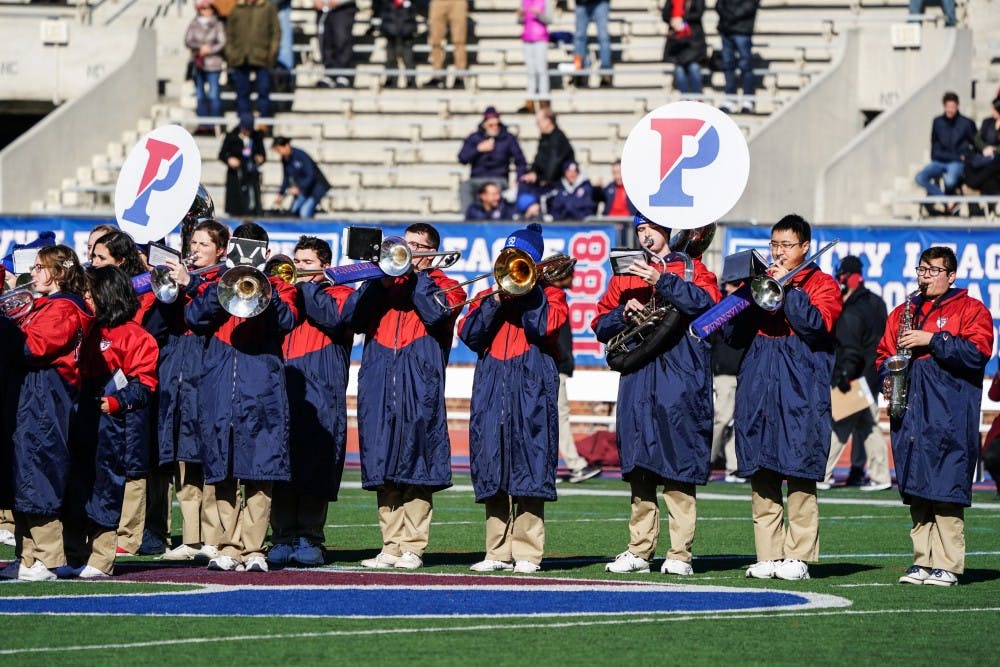They might not be seen, but they sure are heard: from the moment students receive their acceptance to Penn, to four years later when they cross the stage at graduation, the music of the Penn Band plays on. The band is the face of the University — whether it’s cheering on the Quakers in the Palestra or at Franklin Field, marching down Locust Walk for Hey Day, or playing for students starting their time at Penn during NSO. However, for the amount of time and dedication that many members of the Penn Band put in, they receive very little compensation. Because of the band’s integral role in publicity initiatives undertaken by the University and its highly visible presence on campus, the University should divert more funds to support the band’s efforts, and perhaps even pay its members for their services.
Although the band is strictly no-audition and has a flexible attendance policy, the core members of the band sink a huge amount of time into the club. Although the hours can vary wildly from week to week and between seasons, for home games the band can expect to be in rehearsal or on the stands anywhere from eight to 15 hours. For away games, some members of the band sacrifice their entire weekend to cheer on their classmates at far-flung locales across the Ivy League. That doesn’t even take into account the extra hours that leaders of the group spend outside of rehearsal assembling flip folders or staking out the Platt Student Performing Arts House to hold office hours. Despite the fact that most band members genuinely enjoy their time at rehearsal and sporting events, the time commitment can prevent students who have to hold down work-study positions or other jobs from participating as much as they would like.
Plenty of other schools across the east coast provide their bands with scholarship money to reward their members for their service. Elon University, for example, pays each member of the band $20 for every basketball game that they play at, while other universities like Temple provide their bands with scholarships. Granted, Penn’s band technically does fall under the designation of being a D1 Ivy League sports team, so the University is more restricted than other schools in paying its band. That said, however, the band provides plenty of other services outside of its formal function of being a sports group. The University often asks the band to play at various campus events throughout the year, and as the huge amount of pictures of Penn President Amy Gutmann with the band shows, the group also makes up a sizable proportion of how Penn presents itself to the public. Penn should compensate band members for these services, even if they can’t do so for their services at sporting events.
Alternatively, simply by increasing the band’s budget, the University could do a world of good for the most visible club on campus. The University only partially funds the travel expenses for the band, forcing the group to rely on its alumni network to cover the rest of the costs. By allocating more financial support to the band in its budget, Penn Athletics could enable more students to go on road trips during the fall football season. This in turn would allow the band to have a larger presence on the field, making it better equipped to cheer the Quakers on and better able to positively represent the University.
Or, by increasing funding to the band program, the University could eradicate the need for members to pay dues at the start of each season, which typically go towards paying for uniforms and other equipment. Though the band offers aid for students who can’t afford to pay the dues, by being able to eradicate them entirely, the band could swell its ranks by attracting students who aren’t struggling with money, but who don’t want to have to pay to take to the stands.
It is undeniable that the band has a huge presence on campus and that it greatly benefits the Penn community at large. As a recent article by Carter Thompson pointed out, the band serves as an extra player on the court and field and acts as a familiar and enthusiastic face to Penn’s teams when they’re playing home and away. The Penn Band is more than 120 years old and has long served as both a preserver of Penn traditions and a source of school spirit and pride on a campus in desperate need of it. The Penn Band’s services have been invaluable to the University, and the band’s budget ought to reflect that.

JAMES MORRISON is a College freshman from Pipersville, Pa. studying English. His email address is jmorr2@sas.upenn.edu.
SEE MORE FROM JAMES MORRISON:









